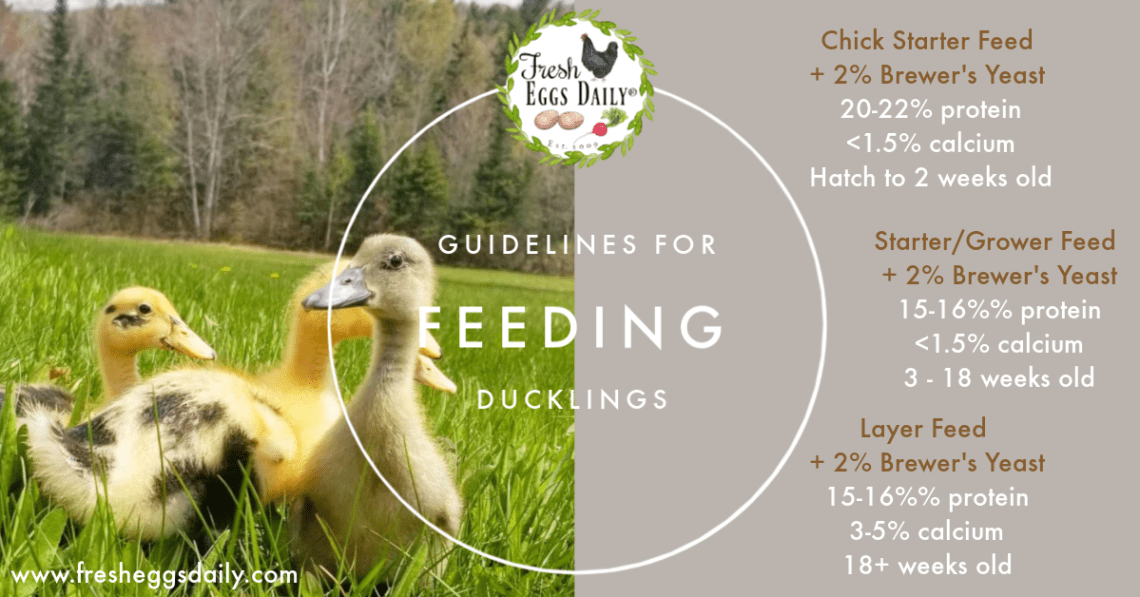
Feeding ducklings at home and what vitamins you need to feed daily ducklings
More and more people who live outside the city are starting to think about raising poultry. Many people choose ducks for these purposes, as they quickly gain live weight and after 2–3 months they are already served at the table, stuffed with apples or cooked in the oven. For the cultivation of ducks in private households, breeds such as Peking and musky are used. Novice poultry farmers, in addition to worries about how to arrange a place for ducklings, often ask themselves the question: how and what to feed ducklings?
Contents
How to feed daily ducklings at home
Ducklings at home must be given ready mixed feed in granules, which were specially developed for chicks of the first days of life. This is the simplest and easiest way to feed ducklings. It is only necessary to regularly pour dry food into the feeders.
However, duck farmers recommend feeding them with natural homemade food. For daily ducklings, hard-boiled eggs are boiled, the shells are peeled off and finely chopped. You can add finely chopped dill. Be sure the diet of growing ducks should be protein feed, such as cottage cheese. Very good ducklings eat crumbly rice porridge boiled in milk, to which greens and chopped eggs are added. It is useful to give them buttermilk, milk or whey, however, these products must be fresh, because low-quality protein foods cause them to malfunction in the gastrointestinal tract and can even cause death.
From the second day of life to ducklings you can give cereal, in particular, barley cut. After a few days, the birds can be given a mixture of wheat, barley and corn grits. When the babies are a week old, they begin to prepare wet mash mash, adding soy or sunflower meal, bone or fish meal, and fodder yeast. It is advisable to add finely chopped fresh herbs to the mash. At home, ducks are fed with the greenery of reservoirs, such as:
- duckweed;
- hornwort;
- Elodea.
Home feed
To prepare your own homemade feed, which was no different from the starter, you need mix the following products:
- wheat, corn and barley turf;
- soybean meal;
- fresh cottage cheese;
- powdered milk;
- meat and bone meal;
- hard-boiled and finely chopped eggs.
This mixture should be mixed very well and laid out in the feeders. It is necessary to cook it immediately before feeding in such an amount that the ducklings ate it in half an hour. The remains of the feed must be removed, because the mash turns sour very quickly and putrefactive and moldy microflora begins to develop. If ducks eat low-quality food, then their mass death may occur.
From the 4th day of life, mineral supplements, such as chalk or shells, are introduced into the diet of ducklings. Highly it is useful to feed them greens and grated vegetables, such as:
- dandelion;
- alfalfa;
- cabbage leaves;
- carrot;
- young shoots of nettle;
- cereals before flowering;
- beet.
Duckling stirrers
Feeding ducklings includes dry food and wet crumbly mash. The dry mixture should always be in the feeders, and the mixers are fed twice a day: in the morning and in the afternoon. This method of feeding is relevant for birds raised for meat. At the same time, the increase in the live weight of ducks is controlled and, taking this into account, the daily supply of feed is adjusted. Shell or gravel is often added to wet food, and can also be placed in a separate feeder for ducklings to easily access.
If available walking areas, then starting from the age of two weeks, ducklings, they can be released there. Although they are not as willing to feed on grass as geese, however, they are happy to feed on some types of plants.
Consequences of an unbalanced diet
Feeding domestic ducks is not considered a difficult task. After 3 weeks of age, food waste is introduced into their diet. By the way, ducklings are the most vulnerable during this period. With intensive growth and a lack of minerals in the feed, birds develop the so-called weakness in the legs. This is due to the fact that ducks are given unbalanced feed with a violation of the ratio of calcium and phosphorus.
In addition, indicators of the amount of metabolic energy, protein, methionine + cystine are considered important. If there are too few sulfur-containing amino acids in the feed, the feathering process will be severely disrupted and the ducks will begin to pluck each other. To avoid this, synthetic protein should be added to the mixers.
Vitamins for ducks
Vitamins are essential for ducks for their normal life. Their deficiency, especially at a young age, when the body of a bird is just beginning to form, leads to to metabolic disorders, reduced productivity and adversely affects overall health.
Fishmeal is rich in vitamins. Broth is boiled on it, and then mash is prepared on its basis, or it is simply added to the feed. Meat and bone meal is also very useful. It is added to the feed for 5-6 day old ducklings. This flour spoils very quickly, and stale food often leads to disruption of the gastrointestinal tract of young ducklings.
Root vegetables like carrots, swede, potatoes, sugar beet and pumpkin, are sources of a large amount of vitamins that little ducklings need for their proper growth.
Conclusion
Any novice poultry farmer is able to raise a healthy bird and get a fairly high-quality carcass. To do this, it is necessary to provide the growing ducks with comfortable living conditions, as well as healthy food containing a wide variety of vitamins and mineral supplements. Only in the case of proper feeding, the bird will be healthy and quickly gain the necessary weight.





